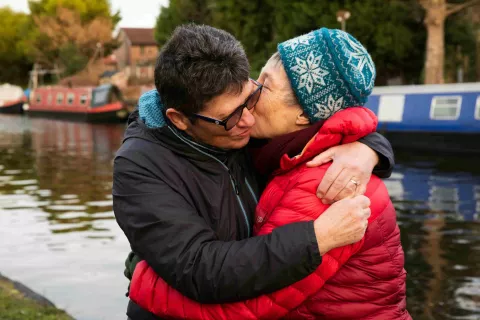We know that many people come to this guide because they are worried and confused about what the DWP considers ‘living with a partner’ to mean. The situation is not helped by the fact that the rules are confusing and frequently misunderstood by the DWP staff themselves. We want to help by explaining this as clearly as possible.
You do not count as living with a partner unless you are living together in the same home as a couple.
There is no set number of nights which mean that the DWP will class you as living together. So, if your partner stays over a few nights a week, that doesn’t mean you should be counted as a couple when it comes to benefits – it depends on lots of other factors.
If you are still living with your ex because you cannot afford to move out, you should not be counted as a couple as long as you intend the split to be permanent. You can claim benefits as single people.
If you have been told something different by the DWP or by friends or family, don’t panic. We will show you how to sort it out.
If your partner stays the night but you have not moved in together
Just because your partner stays the night with you, even if they stay most nights, it doesn’t mean you are living together. If your partner still has a home somewhere else where they pay bills and keeps their things, and you make day to day decisions about your home and finances on your own, then they probably don’t count as living with you.
If you have been contacted by the benefits office because they believe you are living with your partner when they haven’t actually moved in, you will need to show them that your partner doesn’t live with you. Usually, the easiest thing to do is to prove they live somewhere else.
Give the benefits office evidence of any rent, mortgage, council tax, or other bills they pay at their home. If your partner has a driving licence or is the registered owner of a car, these documents are helpful as you are legally required to keep the address on them up to date. Evidence of important letters like phone bills or bank statements that are sent to their home address will also help.
When you give the benefits office the evidence, get a receipt. If you are posting it, get a certificate of posting from the post office (this is free). If you are uploading the evidence to your Universal Credit account, take a screenshot.
If your benefits have been suspended, ask for them to be reinstated. Ask how long that will take and make a note of any details you get, including the name of the person and the time and date. If your benefits are not reinstated by that date, phone the benefits office or write in your Universal Credit journal to chase it up. You may need to make a complaint.
If your benefits have been stopped and a decision has been made that you are living with a partner, you will usually need to ask for a mandatory reconsideration (where you ask for the benefits office to look at the decision again). You are supposed to ask for a mandatory reconsideration within one month, but if that deadline has already past, ask for one anyway (explain that you were unable to do it until now, as you had not been able to access advice or information). Provide all the evidence you can that you are not part of the same household with a partner and that they live somewhere else. You can ask over the phone but, to give yourself the best chance of getting the decision changed at this stage, ask in writing or on the CRMR1 form. You can get details on GOV.UK.
If the mandatory reconsideration is not successful, you should appeal to an Independent Tribunal. You can ask for an appeal online via Appeal a benefit decision on GOV.UK. On the ‘Your reasons for appealing’ screen, explain that you disagree with the decision that you live with a partner, and explain your reasons and evidence as explained above.
Unfortunately, you will probably have to wait a long time before your appeal is heard.
If you have split up but still share the same home
Depending on your circumstances, one or both of you should make a new claim in their name only. You may still need to prove that you are not living as a couple. It will help if you can show that, although you are both still living in the same home, you no longer
- sleep in the same room,
- eat together,
- buy food together,
- do each other’s washing or ironing, or
- pay for things as a couple (for example, you should be able to show that you pay your half of the rent etc, even if you are paying it to your ex), and
- you are making decisions about your lives separately.
If you have a joint bank account, you should close it.
You should let your friends and acquaintances know that you are no longer a couple.
It can feel like it makes very little sense to live like this, particularly if you have children together, but to be entitled to benefits as single people you need to show that you now live as single people. If possible, you need to show the benefits office that you are running two separate households even though you are in the same home.
It can be quite difficult to prove some of these things. It is possible that a benefits officer might come around to check on your arrangements. If you have difficulty convincing the benefits office of your situation, get help from an adviser.
Similar considerations apply if you start living with an ex-partner to save money or because of care needs. You should try to show that you are not living together as a couple. For example, even if one of you does the shopping for both of you, or does all the washing, this may be as part of a care relationship, not as a couple. Having separate financial arrangements will help.
Living with friends in a flatshare
If you are living with a friend, the DWP may sometimes say you have to claim as a couple. If you know that you are not a couple, it’s best to refuse to do this. Your benefits may be suspended – if that happens, provide evidence that you are not a couple and complain.
If your benefits are stopped permanently with a decision that you are living with your friend as a couple, then ask for a mandatory reconsideration (where the benefits office looks at the decision again). You are supposed to ask for a mandatory reconsideration within one month, but if that deadline has already passed, ask for one anyway (explain that you were unable to do it until now as you had been unable to access advice or information). You can ask over the phone but, to give yourself the best chance of getting the decision changed at this stage, ask in writing or on the CRMR1 form. You can get details on GOV.UK.
If the mandatory reconsideration is not successful, you should appeal to an Independent Tribunal. You can ask for an appeal online via Appeal a benefit decision on GOV.UK.
If you have to claim as a couple during this time just to have some money to live on, make it clear (in writing) that you were under pressure and had no choice – it doesn’t mean you are a couple.
Evidence that will help to show you are not a couple could include:
- Separate financial arrangements – you may have to have some shared arrangements for household bills but if you do, show how you’ve decided how much to contribute and try to avoid having a joint fund.
- Cooking and eating separately.
- Making decisions separately.
- If you have children, being the only person who is responsible for them and making decisions about your children, or having clearly separate days where one person takes care of them.
- Showing that you have separate bedrooms.
- Showing that other people know that you are not a couple and don’t think of you as a couple, for example, friends and family members.








